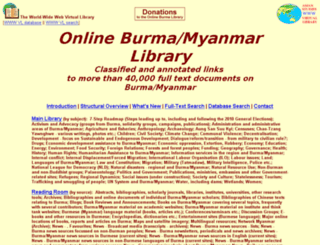Focal point
Location
The Online Burma/Myanmar Library (OBL) is a non-profit online research library mainly in English and Burmese serving academics, activists, diplomats, NGOs, CSOs, CBOs and other Burmese and international actors. It is also, of course, open to the general public. Though we provide lists of Burma/Myanmar news sources, the Library’s main content is not news but in-depth articles, reports, laws, videos and links to other websites, We provide a search engine (database and full text) and an alphabetical list of categories and sub-categories, but the Library is best accessed through browsing the 100 or so categories which lead to sub- and sub-sub categories. These tools should be used in combination.
Members:
Resources
Displaying 741 - 745 of 1151Die Wa in Gefahr. Nach dem Opiumbann droht in der Special Region 2 eine humanitäre Katastrophe
In den Grenzregionen des Shan State im Nordosten Burmas, die seit 1989 unter der Kontrolle der United Wa State Army (UWSA) ist, werden 65 Prozent des gesamten Opiums des Landes angebaut. Trotz der Bereitschaft der Landwirte konnten wegen minderwertiger Bodenbeschaffenheit und klimatischer Bedingungen bisher noch keine Erfolg versprechenden Alternativen zum Opiumanbau realisiert werden. Seit dem kompletten Bann im Jahre 2005 werden tiefgreifende humanitäre Konsequenzen für die Region in Form von Menschenhandel, Armut und mangelnder Sicherheit befürchtet.
A Choice for China: Ending the destruction of Burma's frontier forests
(Press release): "... Ending the destruction of Burma’s northern frontier forests" , details shocking new evidence of the massive illicit plunder of Burma’s forests by Chinese logging companies. Much of the logging takes place in forests that form part of an area said to be “very possibly the most bio-diverse, rich, temperate area on earth.”
Internal Displacement and Protection in Eastern Burma
EXECUTIVE SUMMARY:
"The Thailand Burma Border Consortium (TBBC) first collaborated with communitybased
organizations to document the scale and distribution of internal displacement
in Eastern Burma during 2002. Two years later, another survey was coordinated to
enhance understanding about the vulnerability of internally displaced persons. These
assessments sought to increase awareness about the situation in conflict-affected
areas which remain largely inaccessible to the international community.
Landmine Monitor Report 2005: Burma (Myanmar)
Key developments since May 2004: Myanmar"atrocity demining") was reported in 2004-2005, as in previous years. No humanitarian mine clearance has taken place in Burma. No military or village demining has been reported since May 2004. At a UNHCR seminar in November 2004, the mine threat was identified as one of the most serious impediments to the safe return of internally displaced persons and refugees. Mine risk education is carried out by NGOs on an increasing basis, in refugee camps and within other assistance efforts.
Gold Diggers
Big companies push small prospectors aside in hunt for Burma’s riches...
"In Alice in Wonderland, the Red Queen tells Alice: “A word means what I want it to mean.” That sums up in one sentence the state of Burma’s statute books—particularly those decrees relating to mining the country’s rich resources.
Robert Moody, in his 1998 “Report on Mining in Burma,” put it more directly. The law on mining passed by the Rangoon regime in 1994, he said, “is not just one, but a parade of farts in a bucket.”


